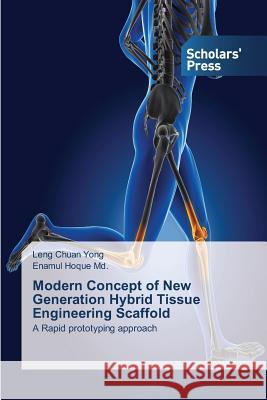Modern Concept of New Generation Hybrid Tissue Engineering Scaffold » książka
Modern Concept of New Generation Hybrid Tissue Engineering Scaffold
ISBN-13: 9783639669602 / Angielski / Miękka / 2014 / 172 str.
Tissue engineering (TE) requires a mechanically stable, biocompatible, and biodegradable scaffold that serves as a foundation for cell adhesion, and cell specific differentiation. Furthermore, the scaffold should be suitable to be in reconstructive surgery. Therefore, fabricated scaffold should mimic the biomechanical properties of the organ or tissue to be employed. To meet such requirements, development of an appropriate 3D scaffold for tissue reconstruction remains a great challenge in various TE fields. In this work, TE scaffolds were manufactured via an in-house built desktop robot based rapid prototyping (DRBRP) system. This book introduced a novel concept of hybrid design TE scaffold, integrating hybrid materials with two or more lay-down patterns were integrated into a single scaffold unit
Tissue engineering (TE) requires a mechanically stable, biocompatible, and biodegradable scaffold that serves as a foundation for cell adhesion, and cell specific differentiation. Furthermore, the scaffold should be suitable to be in reconstructive surgery. Therefore, fabricated scaffold should mimic the biomechanical properties of the organ or tissue to be employed. To meet such requirements, development of an appropriate 3D scaffold for tissue reconstruction remains a great challenge in various TE fields. In this work, TE scaffolds were manufactured via an in-house built desktop robot based rapid prototyping (DRBRP) system. This book introduced a novel concept of hybrid design TE scaffold, integrating hybrid materials with two or more lay-down patterns were integrated into a single scaffold unit











